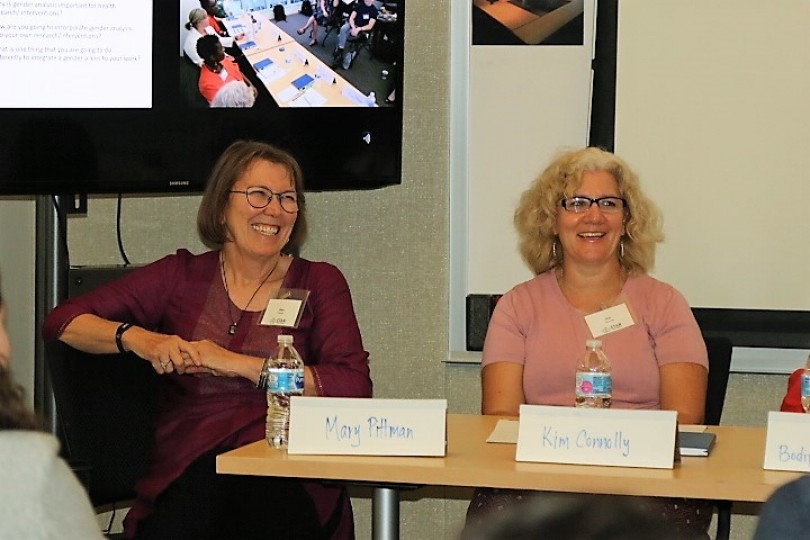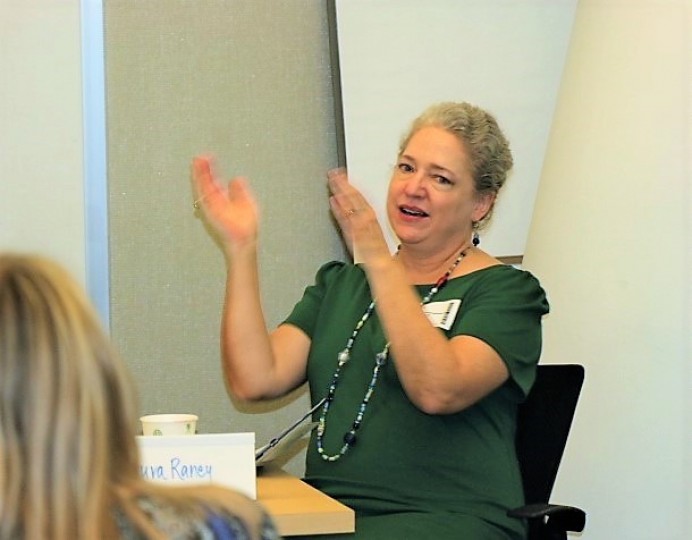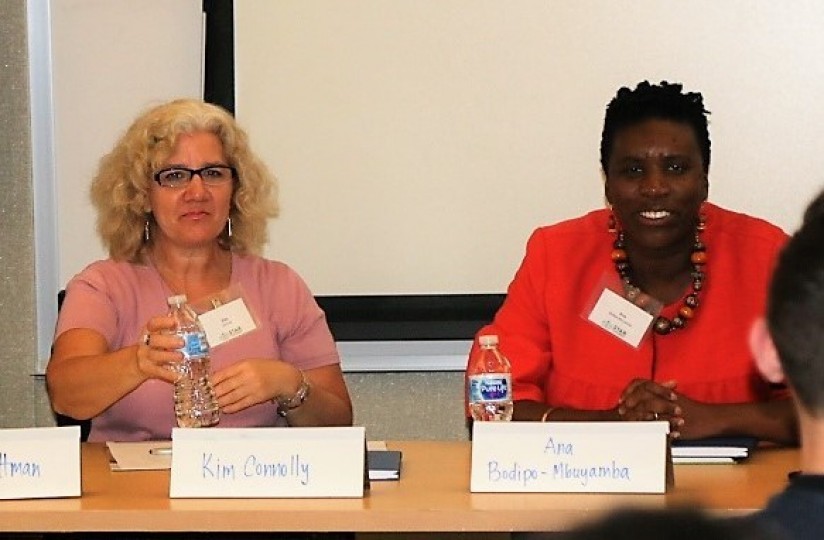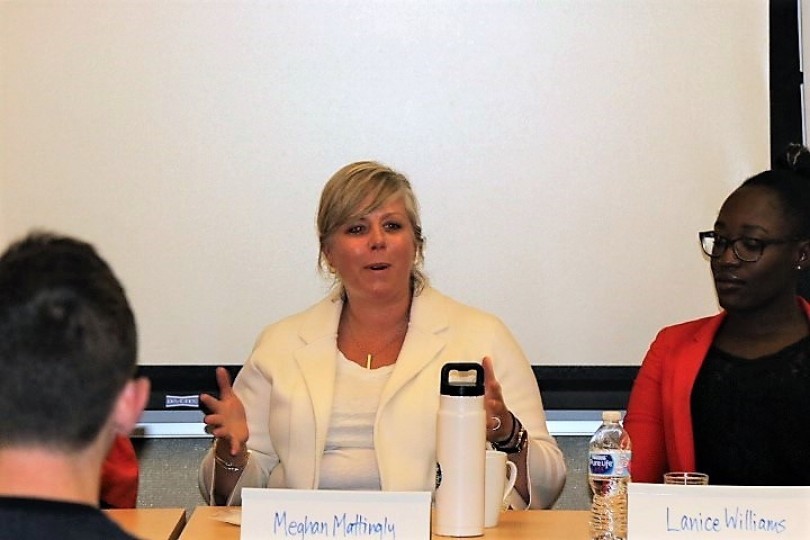Panelists from left to right: Dr. Mary Pittman, Kim Connolly, Ana Bodipo- Mbuyamba, Meghan Mattingly, Lanice Williams, and Laura Raney
On Friday, September 27, Sustaining Technical and Analytic Resources (STAR) staff welcomed Interns to its inaugural STAR Intern career panel. Comprised of six distinguished panelists from USAID and global health implementing partners, the panel introduced participants to a variety of career pathways after concluding their STAR internships. Panelists candidly discussed their careers, including how they ended up in their current roles, detours and regrets, skills to develop, useful career advice they have received, and how to avoid making similar (perceived) mistakes. Following the career panel, Interns, panelists, and STAR staff had an opportunity to informally network with each other.
As a STAR staff attendee, I enjoyed learning about each of the panelist’s career pathway and hearing about their different experiences. When we’re students of global health, we often feel unsure of how we’ll enter the global health arena. Do we need field experience? Do we need foreign language skills? How do we get experience when we’re just starting out, when entry-level jobs now require at least a year or two of experience? I remember these and other questions constantly ran through my mind when I was completing my Master of Public Health in 2011. After completing multiple (unpaid) internships and volunteer roles, including some overseas, I still wasn’t sure if I had what it took to be a competitive candidate. Now that I’m several years into my career – and after working in various nonprofits, non-governmental organizations, the United Nations, and the private sector along the way – I can relate to the concerns that I’m sure many of our Interns are feeling as they embark on their careers. But with the experience I’ve garnered so far, I can also reassure them that things will eventually work out.
One of the best pieces of advice I have ever received was to go out and shake hands. In other words, meet and talk with as many people as possible, because your next opportunity could emerge through your connections. In keeping with the spirit of paying it forward, my advice would be to forego having a five- or 10-year career plan and take whatever next step feels right to you. If it ends up being the wrong fit, learn as much as you can from the experience while looking for the next opportunity.
STAR’s Internships are equipping our early-career leaders with skills to build a solid foundation for their careers; trust the journey, even if it doesn’t make sense right now, because even if an opportunity seems unrelated to what you inevitably want to do, it may still teach you transferable skills that you can apply over the course of your career.
Echoing this sentiment – and with more practical advice – are additional key takeaways from our esteemed panel:
1. “You have to learn to have your own voice.”
When Dr. Pittman was asked about some of the challenges of being a female CEO, she told Interns about the importance of having mentors who encouraged her to speak up. “The only way you’re going to make change happen is if you have the courage to stand up. You may find that people challenge you or disagree with you, but you have to have your conviction and stay your course.”

Panelists Dr. Mary Pittman and Kim Connolly
2. Develop a broad skill set if you want to become a leader.
Dr. Pittman shared advice on specific skills Interns should develop if they want to one day lead organizations:
3. Cultivate your “soft” skills.
While many of us are focused on gaining technical skills – most of which are learned on the job – fewer realize the value of cultivating non-technical, or “soft,” skills. Laura Raney emphasized the importance of being able to effectively communicate: “If you can express yourself verbally and in writing, that goes so much further than lots of other skills. …The analytic skills I developed in undergrad and grad[uate school] and communication skills are really what’s gotten me every job that I’ve had.” In addition to developing communication skills, many panelists emphasized the value of networking.

Panelist Laura Raney
Kim Connolly said, “My first three jobs were because of faculty members that I worked with when I was at the university…opportunities came because I got to know people, and they got to know me.” Reaching out and getting to know people – for example, over coffee conversations – is an important way to broaden your network and make those key connections, which could lead to more opportunities down the road.
4. Mistakes are inevitable – don’t be afraid of making them.
When asked what mistakes they have made in their careers, panelists were open to sharing their experiences and how those revealed deeper perspectives. Lanice Williams said, “In life, you have to make sacrifices to reach wherever it is that you want to reach, whatever goal that it is you’ve set...[the sacrifices] will pay off in the long run, but always weigh the pros and cons.”
“If you’re able to learn from what you did, then it was the right thing to do,” said Ana Bodipo-Mbuyamba. When two opportunities presented themselves around the same time, she understood what was important to her in that moment: “I learned to take more risks and not be so scared…to trust myself that the decisions I’m making are taking me down a path that eventually gets me to where I need to be.” She continued, “Don’t feel like you can’t not make mistakes, don’t feel like you can’t not do things.”

Panelists Kim Connolly and Ana Bodipo-Mbuyamba
5. You may start off doing something completely different – and that’s okay.
Whether it was studying city planning like Dr. Pittman, venturing out on a Peace Corps assignment like Connolly, or working in local government like Williams, there is no one single, defined path to entering global health. In fact, many of our panelists described how not knowing what they wanted to do in their careers enabled them to gain valuable skills and rewarding experiences along the way. Bodipo-Mbuyamba knew she wanted to work overseas but didn’t know how. When she started volunteering with a Boston-based organization, the connections she made through her volunteer work there led to a door opening in the international health arena: “It’s a pathway you don’t really suspect that’s going to happen, but…when you know people and talk to people, and let them know your intentions, they can come about.”

Panelists Meghan Mattingly and Lanice Williams
If you are interested in studying global health or becoming a practitioner, take these tips to heart. Remember that there is no one, single, defined way to enter the global health field. Your career can and, most likely will, diverge into different pathways, some that you may have never even considered traversing. Be open to whatever comes your way, and know that you will contribute to the field of global health when you: find the courage to use your voice and speak up; develop a broad skillset, which includes cultivating your “soft” skills; and continually try new things and learn from them.
To keep the conversation going, follow us on Twitter @GHSTAR_Project. Join our listserv and apply to Fellowship and Internship opportunities.